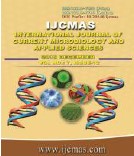


 National Academy of Agricultural Sciences (NAAS)
National Academy of Agricultural Sciences (NAAS)

|
PRINT ISSN : 2319-7692
Online ISSN : 2319-7706 Issues : 12 per year Publisher : Excellent Publishers Email : editorijcmas@gmail.com / submit@ijcmas.com Editor-in-chief: Dr.M.Prakash Index Copernicus ICV 2018: 95.39 NAAS RATING 2020: 5.38 |
Soil is the habitat of one of the most complex of natural biological coin munities in which all the phenomena associated with the struggle for survival occur. This competition is greatly intensifies in the root zone of plants, the rhizosphere, owing to the greater density of its micro population. The Experiment was carried out in the in laboratory of Department of Environmental Science, SHUATS, Allahabad to study the effect of Modern agricultural practices on soil microbial properties of Chaka block of Allahabad district” U.P., INDIA in 2016. The soil samples were collected during January to April 2016 rabi season from 12 sites of farmer’s field and analyzed for total bacteria, phosphorus solubilization, survival of Bacillus spp. in lead (Pb) contaminated soil. In microbiological analysis for diversity in species of Rhizospheric soil samples were found Bacillus spp. and non-rhizospheric soil samples were found Coccus spp. of bacteria. In few samples of Rhizospheric and Non-rhizospheric soil of different villages of Chaka block were found PSB. The bacterial count range from 98×105- 18×106 CFU g-1 soil in rhizospheric soil and from 87×105 - 18×106 CFU g-1 soil in non-rhizospheric soil. In rhizospheric soil gram positive bacteria were found in maximum villages, whereas in non- rhizospheric soil all villages were found gram negative bacteria, except some villages. The range of zone of phosphate-solubilizing bacteria was 3.5-3.7 cm in rhizospheric soil and 1.5-2.8 cm in non rhizospheric soil. Diversity in species of Rhizospheric soil was found Bacillus spp and Non-rhizospheric soil was found Coccus spp of bacteria. The range of survival efficiency of Bacillus spp. was 83.47-97.76 found at lead concentration 250 mg L-1 in rhizospheric soil. The survival efficiency of Bacillus spp was also found in decreasing order with increase in concentration of lead in Rhizospheric soil sample.
 |
 |
 |
 |
 |